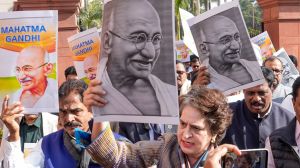In view of challenges faced by Micro, Small & Medium Enterprises (MSMEs) in accessing cheaper imported components and raw material, a high-level committee headed by NITI Aayog member and former Cabinet Secretary Rajiv Gauba has prepared a set of “key recommendations” to simplify the Quality Control Order (QCO) framework, toning down the technical assessment process and revamping the inspection regime, among other things.
Under the Bureau of Indian Standards (BIS) Act, 2016, the BIS sets Indian standards for goods, articles, processes, systems or services in the country.

Standards are defined by the Act as “documented agreements containing technical specifications or other precise criteria to be used consistently as rules, guidelines, or definitions of characteristics, to ensure that goods, articles, processes, systems and services are fit for their purpose.”
To ensure that these standards are followed for imported or domestically produced goods, the BIS grants a licence or ‘certificate of conformity’ to importers or manufacturers of these goods. Upon obtaining a BIS license, an entity can put the Standard Mark on their products which shows that they conform to relevant Indian standards of quality and safety (such as Hallmark for gold and silver jewellery, or ISI marks for a wide range of products).
The BIS has set about 23,000 standards, but most of them are voluntary, that is, an importer or manufacturer is not obligated to obtain a BIS license for the product in question. The government, however, through its powers under Section 16 of the BIS Act, can direct “compulsory” use of a Standard Mark in “public interest or for the protection of human, animal or plant health, safety of the environment, or prevention of unfair trade practices, or national security”, after consulting the BIS.
QCOs are essentially legal directives issued by the concerned ministry or department under the BIS Act specifying certain standards that have to be mandatorily met for a certain product. Products for which QCOs have been notified cannot be manufactured, imported, or sold without a relevant Standard Mark.
Why issue them: improve quality, boost economy
“QCOs serve two purposes,” Vimal Mahendru, vice president, International Electrotechnical Commission (IEC), an international organisation for electrical, electronic, and related technology standards, told The Indian Express on Thursday.
Story continues below this ad
“One, is to improve quality. We want to give quality products to our citizens. For instance, India never had QCOs for toys. But since these have been implemented, the quality of toys available to kids has improved,” he said.
“The other part is, how do you want to promote your own trade and protect your markets from inferior quality of goods coming from other countries? So, QCOs help in that,” Mahendru stated.
Consider hermetic compressors and room air conditioners, for which QCOs came into force in October 2023. As per one official, from less than 2 million in 2021-22, the domestic production of hermetic compressors touched the 8 million mark in 2023-24; the domestic production of domestic room air conditioners grew from around million in 2021-22 to over 12 million in 2023-24.
According to official data, the BIS has notified 187 QCOs covering 770 products till date, including 84 QCOs covering 343 products issued in the past three years.
Mahendru, however, issued a note of caution regarding QCOs.
Story continues below this ad
He said, “You have to balance where you want to protect your market from inferior quality coming in, but also promote good quality products and good innovations from your country going overseas.”
Not all cut & dry: arguments and counters
QCOs have come under criticism from two distinct quarters: domestic industry, particularly MSMEs, and countries such as the US, the UK, New Zealand and the EU with ehom India is negotiating trade deals. Both have sought relaxation in quality norms.
For instance, the US had expressed concerns over India implementing QCOs for chemicals and other materials. As the ‘2025 National Trade Estimate Report on Foreign Trade Barriers’, released by the Office of the US Trade Representative earlier this year, noted: “Since 2019, India has made a number of [BIS] standards mandatory for quality control purposes in an increasing number of sectors, including chemicals, medical devices, batteries,electronics, food, and textiles… India requires that chemicals have BIS marks before importation, which can only be issued following a site visit by an Indian inspector to the manufacturing facility.”
The US, the report further states, “has concerns that BIS standards are not fully aligned with international standards… [they] often do not provide a means of establishing conformity or include significantly burdensome requirements, and lack clear timelines for transition periods and license validity.”
Story continues below this ad
Such concerns were reflected by NITI Aayog vice chairperson Suman Berry earlier this year. Berry called QCOs “malign intervention”. In the high-level committee meeting led by Gauba on September 6, challenges faced by industries and various stakeholders in obtaining certifications under QCOs were discussed.
These criticisms of the current QCO framework, however, are not universally. Some small firms maintain that they have in fact benefitted due to notification of QCOs.
“Before the government issued QCOs for water coolers in 2023, our annual turnover was just Rs 7 crore, which increased to Rs 42 crore in 2024-25,” P K Jain, managing director of Meerut-based Birla Aircon, a small firm that manufactures water coolers and freezers, told The Indian Express.
“We are selling more than 10,000 units every year, which was just few hundreds before the QCOs,” Jain said.
Story continues below this ad
Govt’s actions: addressing key concerns
The Centre on Tuesday said that the Department of Consumer Affairs (DoCA) and BIS have increased engagement with MSMEs, with the intent of addressing their “concerns” about the implementation of the QCOs. The department said it is planning to conduct regional conferences to interact and engage with MSMEs.
“QCOs help in building the capacity of domestic industry, particularly MSMEs, making them export-ready and facilitating their access to global markets. MSMEs often obtain BIS certification by choice, in order to be able to put the ISI mark on their products and assure the consumers about their product quality. It is important to note that out of about 50,753 product certifications issued by BIS, about 40,000 (80%) have been issued to MSMEs, and 24,625 licensees have obtained BIS certification voluntarily,” the DoCA said in a statement.
The BIS has digitised the certification process and ensures time-bound grant of certification to domestic industry, including MSMEs within 30 days under the simplified procedure option covering more than 750 products, the statement added.
“Besides Open House through Jan Sunwai thrice a week, in which anyone can log in and ask queries, Branch Offices of BIS have put in place an initiative called Manak Manthan to have a closer engagement and provide handholding to MSMEs at the field level,” it said.
Story continues below this ad
As per the statement, the certification system of the BIS is being further “streamlined”. “The Department of Consumer Affairs is planning to conduct regional conferences to interact and engage with MSMEs and address their concerns about certification,” the statement said.







































